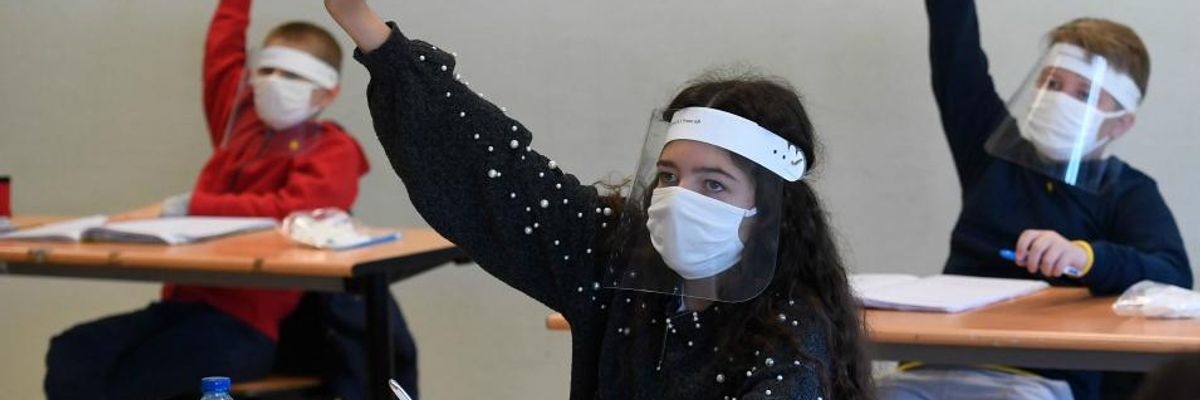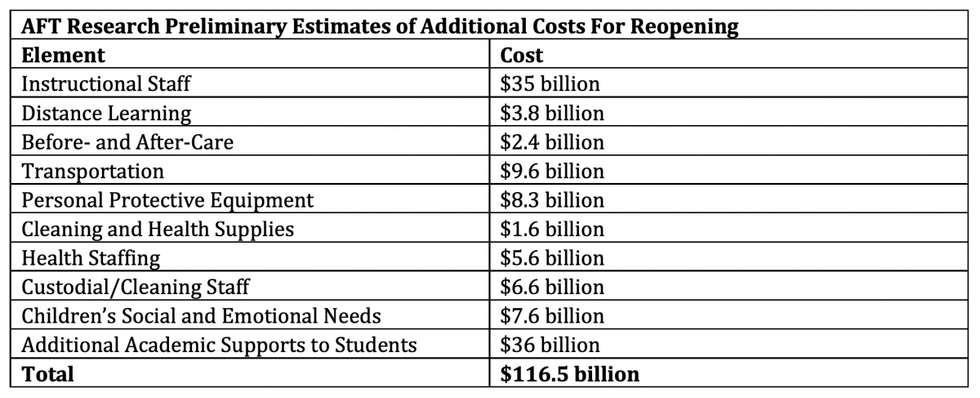A leading U.S. teachers union warned Wednesday that safely reopening K-12 public schools this fall in the midst of the coronavirus pandemic will require an estimated $116.5 billion federal investment--and that's on top of the funding needed to address budget cuts that have cost local education systems over 750,000 jobs.
The American Federation of Teachers (AFT) issued the warning in a report entitled Reopening Schools During a Time of Triple Crisis: Financial Implications (pdf), published just hours before a U.S. Senate Health, Education, Pensions, and Labor Committee (HELP) hearing entitled "Going Back to School Safely."
"This is a five-alarm fire," declared AFT president Randi Weingarten in a statement.
Weingarten explained the importance of returning to classrooms for children, parents, educators, and the economy--then warned that "if schools can't get the money they need to safely reopen, then they won't reopen, period."
"America is facing a triple crisis: a health pandemic, a racial justice crisis, and an economic crisis--and they're all interrelated," she said. "Public schools are centers of their communities and essential to repairing our nation's fraying social fabric. And the economy won't recover fully unless school buildings reopen."
AFT's new report follows a flexible and science-based blueprint on reopening that the union released in late April as well as online polls conducted in May for USA Today that showed both K-12 teachers and parents of school-aged children worry about what a return to in-person learning will mean for safety and education.
The union's estimate for how much it will cost to safely reopen accounts for adding instructional, health, custodial, and cleaning staff; buying supplies, including personal protective equipment; enabling more distance learning; resuming before- and after-school care; making transportation safer; meeting children's social and emotional needs; and providing additional academic support to students.
The $116.5 billion "does not include some additional costs that we could not estimate, especially for facility retrofits," the report notes. "Such retrofits include no-touch faucets and doors, hand-washing stations, upgrades to ventilation systems, signage, and reconfiguration of classrooms and other spaces. We believe the cost of these would be another several billion but cannot make a more specific estimate."
Weingarten expressed frustration with the Republican-controlled Senate and President Donald Trump for refusing to seriously engage with the Health and Economic Recovery Omnibus Emergency Solutions (HEROES) Act, or H.R. 6800, which was introduced and passed by House Democrats in May.
"These numbers show the sheer scale of the effort required," Weingarten said of AFT's analysis, "and the fact that neither the Senate nor the president has begun any negotiations on the HEROES Act is astounding to us. America's teachers are sending an SOS because we know that if we don't return to face-to-face learning, a generation of students will be added to the coronavirus casualty list."
As U.S. News & World Report's coverage of the the AFT analysis explained:
The newest round of coronavirus-relief funding passed by the House of Representatives last month includes $100 billion for both K-12 and higher education. But Senate Republicans have no plans to consider the $3 trillion legislation, which they call "a liberal wish list." Senate Majority Leader Mitch McConnell, Kentucky Republican, has said any additional relief package will be smaller than the $2 trillion package signed into law in late March.
Citing over 750,000 recently lost public education jobs, the AFT report says that "the HEROES Act would help states address these and other potential teacher and support staff job losses by supplying $57.9 billion directly to school districts to offset revenue losses and costs related to the pandemic."
The union analysis found that the HEROES Act funding "is enough money to save and restore 633,000 jobs in public schools nationally, in addition to paying for all the materials and supplies that these workers and their students would typically use." The report says the legislation could save or restore the jobs of an estimated 316,365 teachers, 74,739 teaching assistants, and 241,896 other education personnel.
The AFT estimate of the cost of safely reopening "is the second to surface this week" and the result of a "more severe analysis," according to U.S. News & World Report.
Earlier this week, AASA, the School Superintendents Association, and the Association of School Business Officials International, said that in order to adhere to the Centers for Disease Control and Prevention's safety recommendations for reopening, school districts will be forced to spend nearly $2 million per district that they hadn't budgeted for--a cost so prohibitive that some are now scrapping plans for in-person classes entirely this fall.
Even if the large majority of schools do reopen in the fall, some teachers and students likely won't be there. The USA Today polling from May found that nearly six in 10 parents would consider not sending their children back and one in five educators likely would not return. That figure was one in four among teachers 55 and older.
The U.S. has nearly two million confirmed Covid-19 cases and has seen over 112,000 deaths. Dr. Anthony Fauci, director of the National Institute of Allergy and Infectious Diseases, told a healthcare conference Tuesday that the pandemic has turned out to be his "worst nightmare" and warned that "it isn't over yet."

